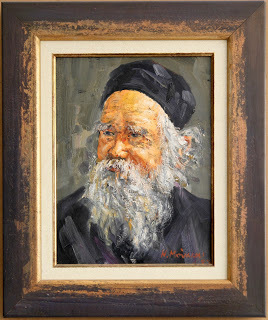Dwight Longenecker's Blog, page 315
December 22, 2011
Ordinary for Anglicans
The news has leaked that Fr. Geoffrey Steenson will be the ordinary for the Anglican Ordinariate in the United States. You can read about it here.
Published on December 22, 2011 12:37
New Edition of Gargoyle Code
I am working on the new edition of Gargoyle Code with a whole new section called 'Slubgrip Instructs'. I plan to publish it as an e-book and audio book this time. Would anyone out there purchase it as an e-book? If so, how much would you be prepared to pay for it?
Published on December 22, 2011 11:40
Another Anglican Bishop Comes Home
Bishop Robert Mercer CR will be received into full communion through the ministry of the Ordinariate of Our Lady of Walsingham. Welcome home! The news is here.
Published on December 22, 2011 11:17
Mantilla on the Veil
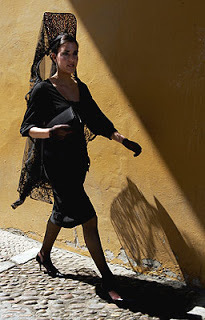
Guest blogger Mantilla Amontillado is the founder of Veritas Vestments. She holds a degree in Ecclesiastical Haberdashery from Salamanca University. She has done the pilgrimage to Santiago de Compostella three times on horseback and is engaged to the famous matador, Senor Augusto Torquemada.
OK. Hon. I know I been very busy. See Veritas Vestments is getting big orders and I have to get them all done for Christmas you know? So I don't have too much time to write about these things, so I give you this little article a nice girl in America write about wearing the veil to Holy Mass. OK. OK. I know the veil is a little bit, you know, wimpy. It's not really a mantilla, but it's better than nothing.
Sometime I visit in America and when I go to Mass I can't believe my eyes. Girls coming to Mass wearing shorts and flippy floppies or what you call them? Sometime they are wearing tops with little thin straps over the shoulder and you can see their underwear. Hon. This is not good. Sure, it is not too modest, but to tell you the truth, usually the girl who wear these clothes is not too sexy anyway. You know what I mean? So it's not only no modest, it's not nice to look at anyway. They should cover up. Then sometime they are chewing gum as well! Madre de Dios! They are looking like cows chewing the cud you know?
So I think maybe if some girls wear the veil, then they dress the right way in those other clothes too you know? You never see girls in veils wearing halter tops. And another thing hon. They way we dress? Everybody think it doesn't matter. They think it is only our business and nobody else should care. When I am in America and ask my nieces about this they say, "Mantilla, it is nobody else's business what I wear to church."
So I say, "What you talking about! I am the one who has to look at you! So what you wear is my business. What you wear at home? That's your business. You go around naked if you want. At home you go around wearing a big bunny suit if you want. I don't care. But you come to church I have to look at you. You know?" Anyway hon. It is making me mad this kind of talk. So I say to her, "Look. What I wear to church make you think something and make you feel something. Same thing. What you wear to church make me think something and feel something, and when I see you wear beach clothes to church it make me think of the beach and not of heaven and God and Jesus and Mary. When I dress nice for church it make you think nice things about Jesus and Mary."
Another thing hon. The way we dress make us behave a certain way. You dress in a fancy ball gown you behave like a lady. You dress in blue jeans and a slouchy shirt you behave in a slouchy way. It's not hard. Look at Augusto. He dress in his outfit to be matador and so he behave brave and strong and true. He don't go out to be a matador dressed in blue jeans. He's no slouch out there.
If he do that El Toro probably not respect him and get mad and he gets gored, and no more Augusto. You know? Same thing with El Diablo--you go to church dressed like you are going to a picnic and you are chewing gum? He not going to respect you. El Diablo is going to poke a hole in you hon, and Jesus is just going to stand there doing nothing because he don't like those beach clothes in Mass anyhow.
You know what I mean hon?
Published on December 22, 2011 11:01
Infinity and Infancy
George Weigel reviews a new book here about the wonder of the Incarnation. God becomes man so that man might become like God. If only, this Christmas, we might fully understand the implications of the Incarnation.
Published on December 22, 2011 10:49
Thoughts on the Anglican Ordinariate
On January first Archbishop Wuerl will announce the erection of the Anglican Ordinariate in the United States. This is the special structure provided by the Holy Father to allow Anglicans to come into full communion with the Catholic Church while retaining elements of their distinct cultural patrimony. I have been invited to preach at the Evensong the night after the Rector and members of Mount Calvary Church in Baltimore are received on January 22. I'll have to rustle up my preaching scarf, tabs, and academic hood I suppose....Who woulda thought it?
It is an exciting time for all those Anglicans the world over who have longed to retain their traditions and be in full communion with the Catholic Church. The Ordinariate was established in England last summer, and plans for the Australian ordinariate are well under way.
We really are witnessing a historic step in ecumenism. After years of discussion and progress in many ways a structure has been provided to allow full communion between Anglicans and Catholics. The establishment of the Ordinariate has clarified matters between the two churches. Benedict XVI has, if you like, called the bluff of all those Anglicans who kept on saying, "We are Catholics too you know...just not Roman Catholics." Then they would go on in pious phrases, "We do long to become Catholics and to achieve unity, but we do not want to give up our distinct patrimony."
OK. It's all possible now. Anglicans can come into full communion with Rome. They can keep their distinct patrimony. They have their own hierarchy. Their married men may be ordained. They can have their own religious orders, their own seminary and their own churches and their own form of church government. What else do they want? The numbers who take up the Pope's offer will be small, because they will have to launch out in faith.
Many will have to leave their buildings and financial security behind. They will have to build churches from scratch. They will endure hardship and persecution from their former friends and family and colleagues, but what will emerge is a little group of Anglicans--now Catholis--who will contribute to the whole church and establish a secure place for the riches of Anglicanism to prosper and survive.
Most importantly, the Ordinariate has established a new direction not just for Anglican-Catholic relations, but for the whole future of ecumenism. Benedict XVI has re-written the rule book. No longer are we engaged in long, polite (and endless) discussions. Instead there is action. A way forward is possible. All that remains is to see who will avail themselves of this option.
Finally, this new direction takes the whole church down a new path. Catholics think in the long term. Who knows what will come of this historic moment? How will the newly accepted Anglican clergy contribute to the whole church? What gifts will they and the lay people bring? How will their gifts influence the Catholic Church in English speaking lands? How will their pioneering effort touch other people's lives?
I can only speak from experience. I left the Anglican Church to become a Catholic in 1995. I just did what I had to do. I never thought that it would influence anyone else, yet over the years my own action of obedience to God's call has influenced many people. I never thought I would write books or speak or do broadcasting. I never thought I would have people write to me saying that my decision sparked theirs and that they had come into the church through my writing.
I never thought of any of that, and yet by God's grace something greater happened than I ever could have imagined. I hope and pray that similar graces unfold as our brave Anglican brothers and sisters take the step of coming home to Rome.
UPDATE: Virtue OnLine reports that the Ordinary for the American Ordinariate will be Fr Geoffrey Steenson. Read about it here.
It is an exciting time for all those Anglicans the world over who have longed to retain their traditions and be in full communion with the Catholic Church. The Ordinariate was established in England last summer, and plans for the Australian ordinariate are well under way.
We really are witnessing a historic step in ecumenism. After years of discussion and progress in many ways a structure has been provided to allow full communion between Anglicans and Catholics. The establishment of the Ordinariate has clarified matters between the two churches. Benedict XVI has, if you like, called the bluff of all those Anglicans who kept on saying, "We are Catholics too you know...just not Roman Catholics." Then they would go on in pious phrases, "We do long to become Catholics and to achieve unity, but we do not want to give up our distinct patrimony."
OK. It's all possible now. Anglicans can come into full communion with Rome. They can keep their distinct patrimony. They have their own hierarchy. Their married men may be ordained. They can have their own religious orders, their own seminary and their own churches and their own form of church government. What else do they want? The numbers who take up the Pope's offer will be small, because they will have to launch out in faith.
Many will have to leave their buildings and financial security behind. They will have to build churches from scratch. They will endure hardship and persecution from their former friends and family and colleagues, but what will emerge is a little group of Anglicans--now Catholis--who will contribute to the whole church and establish a secure place for the riches of Anglicanism to prosper and survive.
Most importantly, the Ordinariate has established a new direction not just for Anglican-Catholic relations, but for the whole future of ecumenism. Benedict XVI has re-written the rule book. No longer are we engaged in long, polite (and endless) discussions. Instead there is action. A way forward is possible. All that remains is to see who will avail themselves of this option.
Finally, this new direction takes the whole church down a new path. Catholics think in the long term. Who knows what will come of this historic moment? How will the newly accepted Anglican clergy contribute to the whole church? What gifts will they and the lay people bring? How will their gifts influence the Catholic Church in English speaking lands? How will their pioneering effort touch other people's lives?
I can only speak from experience. I left the Anglican Church to become a Catholic in 1995. I just did what I had to do. I never thought that it would influence anyone else, yet over the years my own action of obedience to God's call has influenced many people. I never thought I would write books or speak or do broadcasting. I never thought I would have people write to me saying that my decision sparked theirs and that they had come into the church through my writing.
I never thought of any of that, and yet by God's grace something greater happened than I ever could have imagined. I hope and pray that similar graces unfold as our brave Anglican brothers and sisters take the step of coming home to Rome.
UPDATE: Virtue OnLine reports that the Ordinary for the American Ordinariate will be Fr Geoffrey Steenson. Read about it here.
Published on December 22, 2011 10:45
December 20, 2011
On Awful Catholic Music
John Zmirak rants here about the sappy, dreary hymns sung in so many Catholic churches.
What he doesn't get into (because he's too busy being witty) is the reason for such excruciatingly bad Catholic music. The reason is (with apologies to the Holy Father) the dictatorship of sentimentality.
Catholics in English speaking countries (and maybe everywhere else for all I know) have drifted into sentimentality because they are too afraid of embracing the full blooded, supernatural, dogmatic religion we call Catholicism, and the rot began with the clergy who came out of seminary full of the modernistic critical theories about the Scriptures and the faith.
They couldn't believe that sort of thing in the modern age, so they concocted another gospel which was all about being friends with Jesus and hanging up felt banners with words on them, and making the world a better place and the church a happy fellowship sort of group therapy session.
The music is a bad dream, but when you consider that the music matches the theology the nightmare is even worse.
What he doesn't get into (because he's too busy being witty) is the reason for such excruciatingly bad Catholic music. The reason is (with apologies to the Holy Father) the dictatorship of sentimentality.
Catholics in English speaking countries (and maybe everywhere else for all I know) have drifted into sentimentality because they are too afraid of embracing the full blooded, supernatural, dogmatic religion we call Catholicism, and the rot began with the clergy who came out of seminary full of the modernistic critical theories about the Scriptures and the faith.
They couldn't believe that sort of thing in the modern age, so they concocted another gospel which was all about being friends with Jesus and hanging up felt banners with words on them, and making the world a better place and the church a happy fellowship sort of group therapy session.
The music is a bad dream, but when you consider that the music matches the theology the nightmare is even worse.
Published on December 20, 2011 09:41
Is the Pope a Dictator?
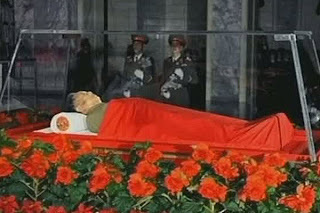
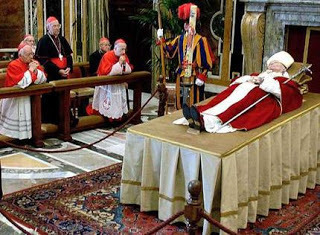
Some time ago a non Catholic, who is usually a pretty rational and tolerant fellow opined that the Pope is a dictator.
Witnessing the scenes in North Korea on the death of Kim Il Jong, I have had to compare his passing with that of Pope John Paul II.
There they both are--lying in state. The crowds are massive and hysterical. Their 'dear leader' has gone. The grief is great. Children have lost their father. Their mentor and role model has died.
What interests me in the comparison is the religious psychological dynamic. The creepy adulation of the North Koreans indicates a level of brainwashing and group thought rarely witnessed today. I suppose there may be some Catholics who revere the Pope in an unhealthy way, and that there may be some who worship their 'dear Leader' like the North Koreans. But I haven't met any. Far more Catholics regard the Pope as a nice old fellow in Rome who is the figurehead of their religion and who they otherwise ignore. I guess there might be some immature Catholics who invest in the Pope as if he is some sort of divine being, and who long to march in lock step with the rest of his faithful troops. Maybe the exalted claims for papal authority lend themselves to this sort of abuse, but I haven't encountered it. The Catholics I meet are far more likely not to understand what the title 'Vicar of Christ' means and think "Papal Infallibility" is an outdated concept. Some dictatorship.
Of course similarities can be drawn by those who wish to be cynical, but similarities of appearance between two things do not mean they are identical. After all, a counterfeit dollar bill looks much like the real thing; in fact the better the counterfeit, the more it resembles reality. The best lie resembles the truth.
So, is the Pope a dictator? Some critics used to compare Bl. John Paul II to the rulers of communist Russia--"He rules with absolute power from his little walled city state--just like the dictators in the Kremlin." Is it so? From one perspective it might look that way. Or are the similarities those between the truth and a counterfeit?
It doesn't take long to assess the real difference. The dictator uses force to impose his will. The Pope does not. He has no battalions. The only soldiers he has dress like court jesters and carry halberds. (yes, I know they're trained in modern security techniques) The point is that the Pope proposes. He does not impose. If people wish to be Catholic and conform their lives to the teaching of the church they are free to do so. They are also free not to do so. No one forces anyone to be Catholic.
Once within Catholicism, however, there are certain expectations. Catholics are expected to fulfill their obligations as a response to the rights they enjoy as Catholics. Those who have formal positions teaching the Catholic faith are expected to teach the Catholic faith. Within the body there is a level of discipline to be sure, but that discipline is only what might be expected within any organization that has a mission and a job to fulfill. If you're taking the paycheck you have to do the work.
Have there been times in the past when Popes have abused their power and been tyrants or dictators? I think there have been a few. Have there been times when the faithful have given too much adulation to a pope and honored him too highly? Probably. Have there been Popes who imposed rather than proposed? Yes, some.
But abuses do not undo right uses, and I have to say that since becoming a Catholic I can't think of any Catholics I know who idolize the Pope the way critics say we do. All the Pope can do is teach the truth and propose a way to follow Christ.
The Pope is not a dictator.
He is the Servant of the Servants of God, a shepherd, a rock and a steward of Christ's kingdom.
Published on December 20, 2011 08:17
Change the World
Published on December 20, 2011 08:08
Turin Shroud is Authentic
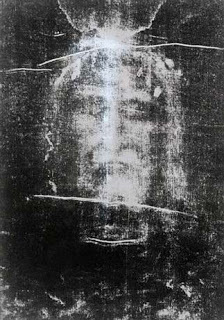
A new study released this week by a team of Italian scientists has given further evidence for the Shroud of Turin's authenticity. This article from the Daily Telegraph reports a new approach to shroud studies. The scientists set out to replicate the mysterious images on the cloth, and found that the only method that could create the same kind of image was ultraviolet light--described as "some form of electromagnetic energy such as a burst of light at low wavelength."
This is good news for shroud believers (which I have always been) and reminds us that in the midst of debates with the atheists and agnostics we must always return to the resurrection of Christ. The whole argument for Christianity has been and always will be the resurrection event. Either it happened or it didn't. Those who wish to think through the question of the Christian faith must examine the evidence.
The Shroud of Turin is not proof of the resurrection, but it is an intriguing reminder that the evidence must be collected and sorted. Those who doubt the Christian faith seem happy to dismiss the resurrection with a wave of the hand based on rationalist assumptions that miracles don't happen. Otherwise intelligent people use David Hume's stupid statement that "Miracles don't happen because miracles can't happen." In other words, my philosophical worldview does not permit miracles. Therefore miracles do not occur. And this from people who object to "blind faith"? C'mon.
The problem with the doubters who never really stop to consider the resurrection is, ironically enough, the same problem with the majority of Christians. How many people who call themselves Christians have really stopped and considered the radical fact of the resurrection? Oh yes, they accept the story with a ho hum and a yawn on Easter day, but then forget about it the rest of the year and never really stop to consider the implications. If the resurrection is true, then so is the rest of the Christian gospel.
If Jesus Christ is risen from the dead, then all the magnificent claims about him in the New Testament are true too. He really is King of Kings and Lord of Lords. He is the power by whom all things were created and by whom all things consist. He really is the one before whom every knee shall bow and every tongue confess. He is the Lord of Glory. He is the Son of Man and Son of God.
But these magnificent claims are watered down and the risen Lord is turned into some sort of spineless social worker--a martyr for a cause and an admirably naive and idealistic Jewish rabbi. If that is all he is, to hell with it.
I'm for the resurrected Lord and I'm for the Shroud of Turin. Always have been, and if one day they show it to be a fake and really prove it, well then, I'd rather be guilty of believing too much than too little. I'd rather be guilty of being gullible than cynical. I'd rather hold my head and say, "Gee, I'm sorry I was taken in and believed too much. Forgive me for being a fool."
Published on December 20, 2011 07:20
Dwight Longenecker's Blog
- Dwight Longenecker's profile
- 80 followers
Dwight Longenecker isn't a Goodreads Author
(yet),
but they
do have a blog,
so here are some recent posts imported from
their feed.


